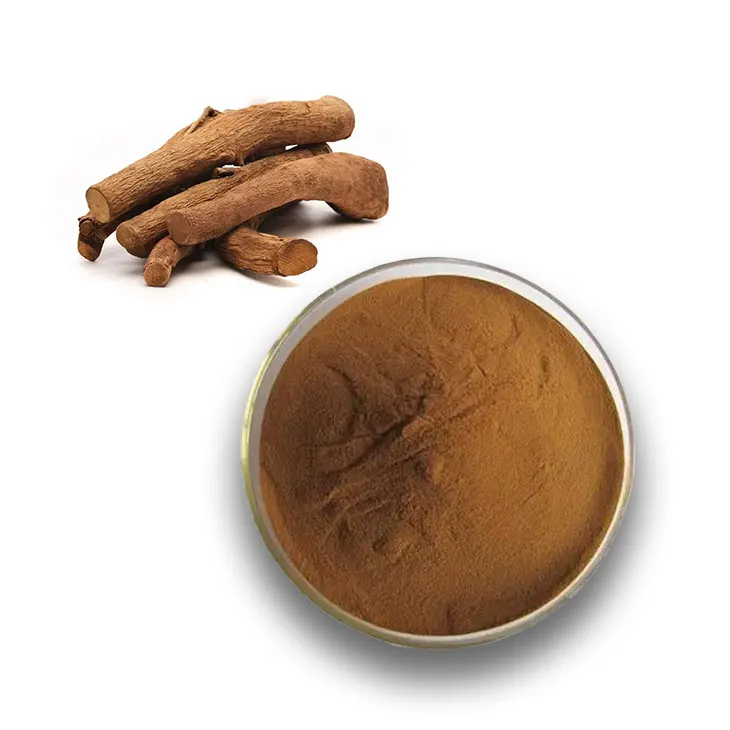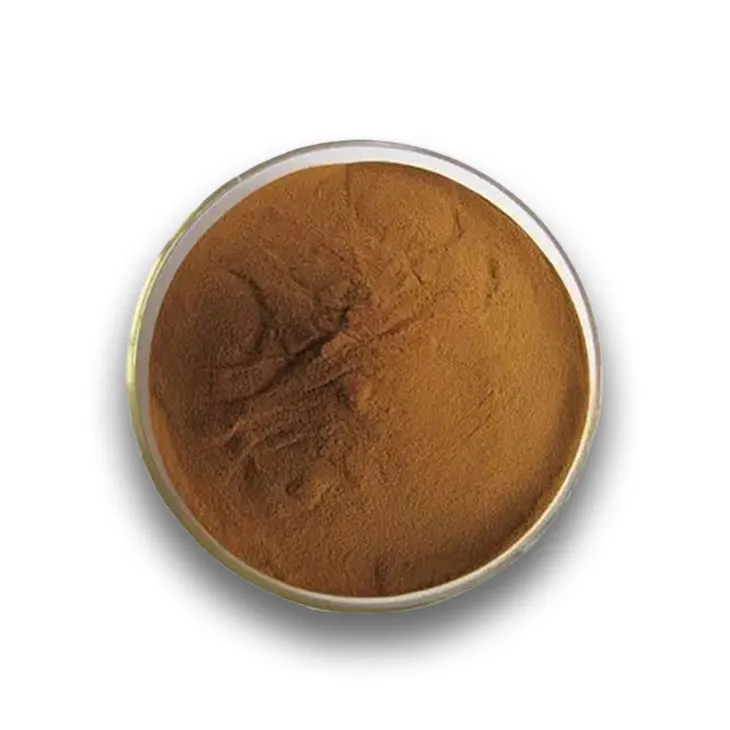- 0086-571-85302990
- sales@greenskybio.com
Powerful Tongkat Ali extract: Its role in sports performance.
2024-11-14

1. Introduction
In the world of sports and athletic performance, athletes are constantly in search of natural supplements that can give them an edge. Tongkat Ali Extract has emerged as a potential candidate with a range of properties that may enhance various aspects of athletic performance. This article will delve deep into understanding how Tongkat Ali Extract interacts with the body to potentially boost performance, with a focus on its effects on metabolism, body composition, and the ability to endure intense training sessions.

2. What is Tongkat Ali?
Tongkat Ali, also known by its scientific name Eurycoma longifolia, is a plant native to Southeast Asia. It has been used in traditional medicine for centuries for various purposes, including enhancing male virility and overall health. The active compounds in Tongkat Ali are thought to be responsible for its potential physiological effects.
The extract of Tongkat Ali is typically obtained through a process that isolates and concentrates these active compounds. This makes it more potent and easier to administer in supplement form.

3. Tongkat Ali and Metabolism
3.1. Influence on Energy Production
One of the key ways Tongkat Ali Extract may impact athletic performance is through its effect on metabolism. Metabolism is the set of chemical reactions that occur within the body to convert food into energy. Tongkat Ali has been shown to potentially enhance mitochondrial function.
Mitochondria are often referred to as the "powerhouses" of the cells as they are responsible for producing adenosine triphosphate (ATP), the primary energy currency of the body. By improving mitochondrial function, Tongkat Ali extract may increase the efficiency of ATP production. This can result in more energy being available for athletes during exercise, allowing them to perform at a higher intensity for longer periods.
3.2. Regulation of Hormonal Metabolism
Tongkat Ali also has an impact on hormonal metabolism. It is known to affect the levels of certain hormones in the body, such as testosterone. Testosterone is an important hormone for both male and female athletes. In men, it plays a crucial role in muscle building and strength development. In women, it also contributes to muscle mass maintenance and overall athletic performance at appropriate levels.
Studies have suggested that Tongkat Ali extract may help to optimize testosterone levels within a normal range. This can lead to increased muscle protein synthesis, which is essential for building and repairing muscle tissue after exercise. As a result, athletes may experience faster recovery times and greater gains in muscle strength and size over time.

4. Tongkat Ali and Body Composition
4.1. Muscle Building
As mentioned earlier, Tongkat Ali's influence on testosterone levels can contribute to muscle building. Testosterone promotes the growth of muscle fibers by increasing the rate of protein synthesis. With the help of Tongkat Ali extract, athletes may be able to build muscle more effectively.
Moreover, Tongkat Ali may also enhance the body's ability to utilize nutrients for muscle growth. It can improve the absorption and utilization of amino acids, which are the building blocks of proteins. This means that the body can make better use of the dietary protein consumed, leading to more efficient muscle building.
4.2. Fat Loss
In addition to muscle building, Tongkat Ali extract may also play a role in fat loss. A higher metabolic rate, as potentially induced by Tongkat Ali, means that the body burns more calories at rest. This can contribute to a reduction in body fat percentage.
Furthermore, Tongkat Ali may also affect lipid metabolism. It can help to regulate the levels of lipids in the blood, preventing the accumulation of excess fat. By promoting a healthier lipid profile, Tongkat Ali extract can support overall body composition improvement, which is beneficial for athletes looking to achieve a leaner physique while maintaining muscle mass.
5. Tongkat Ali and Endurance in Training
5.1. Reducing Fatigue
During intense training sessions, fatigue can quickly set in and limit an athlete's performance. Tongkat Ali extract may help to reduce fatigue in several ways. Firstly, as it improves energy production through enhanced mitochondrial function, athletes may experience less muscle fatigue. The continuous supply of ATP means that the muscles can contract and relax more efficiently, delaying the onset of fatigue.
Secondly, Tongkat Ali's effect on hormonal balance, particularly testosterone, can also contribute to reduced fatigue. Testosterone has been associated with increased stamina and endurance. By maintaining optimal testosterone levels, athletes may be able to train harder and for longer periods without feeling overly tired.
5.2. Improving Recovery
Recovery is a crucial aspect of athletic performance. Tongkat Ali extract can play a significant role in post - training recovery. Its ability to enhance muscle protein synthesis means that muscle damage caused by intense exercise can be repaired more quickly.
Also, Tongkat Ali may have anti - inflammatory properties. Inflammation is a natural response to exercise - induced stress, but excessive inflammation can slow down recovery. By reducing inflammation, Tongkat Ali extract can help athletes bounce back faster from training sessions, allowing them to resume training sooner and with greater intensity.
6. Safety and Considerations
While Tongkat Ali extract shows promise in enhancing athletic performance, it is important to consider its safety. In general, when taken at recommended doses, Tongkat Ali is considered safe for most healthy individuals.
However, there may be some potential side effects, such as mild gastrointestinal discomfort in some cases. Additionally, as it can affect hormonal levels, it is crucial for athletes to ensure that they are not violating any anti - doping regulations, especially in competitive sports. Athletes should consult with a healthcare professional or a sports nutritionist before starting to take Tongkat Ali extract to ensure its suitability for their individual needs.
7. Conclusion
Tongkat Ali extract has the potential to play a significant role in athletic performance. Its effects on metabolism, body composition, and the ability to handle intense training sessions make it an attractive option for athletes looking to enhance their performance naturally. However, further research is still needed to fully understand all of its mechanisms of action and to ensure its long - term safety and effectiveness. Athletes should approach the use of Tongkat Ali extract with caution and under the guidance of professionals to maximize its benefits while minimizing any potential risks.
FAQ:
What is Tongkat Ali extract?
Tongkat Ali extract is derived from the Eurycoma longifolia plant. It contains various bioactive compounds such as quassinoids, alkaloids, and glycosides which are believed to have multiple effects on the body.
How does Tongkat Ali extract boost metabolism?
Tongkat Ali extract may increase metabolism by influencing certain hormonal levels in the body. For example, it could potentially enhance thyroid function which plays a key role in regulating metabolic rate. Additionally, it might affect the body's energy - producing processes at a cellular level, leading to more efficient use of nutrients and an overall increase in metabolic activity.
Can Tongkat Ali extract improve body composition?
Yes, it has the potential to improve body composition. It may help in increasing muscle mass and reducing body fat. By enhancing the body's anabolic processes, it promotes muscle growth. At the same time, it could potentially increase fat oxidation, which helps in reducing the amount of stored fat in the body.
How does Tongkat Ali extract help in handling intense training sessions?
Tongkat Ali extract may help in handling intense training sessions in several ways. It could enhance the body's energy levels by improving mitochondrial function, which is crucial for energy production during exercise. It may also reduce fatigue and improve recovery time, allowing athletes to train more frequently and with greater intensity. Additionally, it might have anti - inflammatory properties which can help in reducing muscle soreness and damage caused by intense workouts.
Are there any side effects of using Tongkat Ali extract?
When used in appropriate doses, Tongkat Ali extract is generally considered safe for most people. However, some individuals may experience mild side effects such as insomnia, restlessness, or increased blood pressure. It is important to follow the recommended dosage and consult a healthcare professional before starting to use it, especially for those with pre - existing medical conditions.
Related literature
- The Effects of Tongkat Ali (Eurycoma longifolia) on Testosterone and Athletic Performance: A Systematic Review"
- "Tongkat Ali Extract: Potential Benefits for Physical Activity and Health"
- "Bioactive Compounds in Tongkat Ali and Their Impact on Exercise Physiology"
- ▶ Hesperidin
- ▶ citrus bioflavonoids
- ▶ plant extract
- ▶ lycopene
- ▶ Diosmin
- ▶ Grape seed extract
- ▶ Sea buckthorn Juice Powder
- ▶ Beetroot powder
- ▶ Hops Extract
- ▶ Artichoke Extract
- ▶ Reishi mushroom extract
- ▶ Astaxanthin
- ▶ Green Tea Extract
- ▶ Curcumin Extract
- ▶ Horse Chestnut Extract
- ▶ Other Problems
- ▶ Boswellia Serrata Extract
- ▶ Resveratrol Extract
- ▶ Marigold Extract
- ▶ Grape Leaf Extract
- ▶ blog3
- ▶ blog4
- ▶ blog5
-
Organic Tongkat Ali extract powder factory.
2024-11-14
-
How to make powder with ashwagandha extract.
2024-11-14
-
Rosehip extract manufacturers from China.
2024-11-14
-
The best cat's claw extract in nature.
2024-11-14
-
Chinese Dandelion Leaf Extract Suppliers.
2024-11-14
-
Artichoke Leaf Extract
2024-11-14
-
Sophora Flavescens Root Extract
2024-11-14
-
Yellow Pine Extract
2024-11-14
-
Purple Sweet Potato Extract
2024-11-14
-
Stevia Extract
2024-11-14
-
Chasteberry Extract
2024-11-14
-
Troxerutin
2024-11-14
-
Bitter Melon Extract
2024-11-14
-
Chaste Berry Extract
2024-11-14
-
Cactus Extract
2024-11-14





















